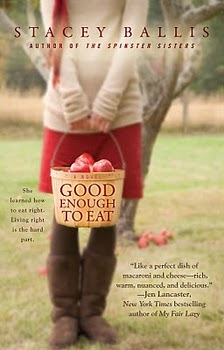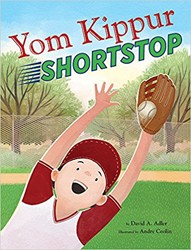On Monday, Stacey Ballis wrote about Rosh Hashanah cooking. Her newest book, Good Enough to Eat, is now available.
 As I mentioned before, my Judaism, while deeply rooted and very important to me, is something that falls more on the side of culture and tradition and less specifically on the side of religion or spirituality. But there are certain aspects of every holiday that resonate for me, and one of the things I appreciate about being Jewish, is that I can feel free to cherry pick the pieces I like and leave the rest behind.
As I mentioned before, my Judaism, while deeply rooted and very important to me, is something that falls more on the side of culture and tradition and less specifically on the side of religion or spirituality. But there are certain aspects of every holiday that resonate for me, and one of the things I appreciate about being Jewish, is that I can feel free to cherry pick the pieces I like and leave the rest behind.
As we look towards the High Holidays, I thought I would share some of my traditions with you, and some of my traditional recipes.
As we did not, nor do not, belong to a temple, the High Holidays were always spent with family and friends. Actually, the friends in question are basically family. I’m blessed with several families, extra parents abound (all of the love and advice and support but none of the discipline or college tuition), and I’ve got enough siblings-by-choice to sort of feel fundamentalist Mormon (without the polygamy or prairie clothes). Not to mention a truly ridiculous number of bonus nieces and nephews. Some of my earliest memories are of spending the High Holidays with different configurations of these special friends. Often we gather at my family’s weekend place in the country, a place away from the hustle and bustle, with plenty of trees and green, wide open sky and fresh air. A place where, if one is inclined to commune with a higher power, it seems like the kind of place the deity of your choice just might be hanging out.
After some happy outdoor activity, sort of a nod to Adonai, “thanks for all the cool nature and stuff,” we retire to the nearest convenient living room. On Yom Kippur there’s a rousing chorus of “Isn’t it sundown somewhere?” and “I don’t think I’ve ever been this hungry in my life!” And before you get all shocked that most of our merry band of skip-the-services practitioners actually do fast, it is important to note a few things. One, we almost never make it all the way to sundown, we tend to break out the chopped liver round about 4pm, and feel virtuous enough to have made it that far. Two, the fasting packs a devilish one-two punch, it both connects you meaningfully to the tradition, and also gives you total guiltless permission for a major Jew-food binge for the rest of the evening.
At some point in the afternoon, we break out the “All things Jewish explained” books, and take turns reading about the origin of the holiday at hand. On Rosh Hashanah we might offer up some New Year’s resolutions to the group, on Yom Kippur there is meaningful atonement-type eye contact around the room, in case you may have accidentally offended someone present.
I actually like the fasting aspect of the holiday, which is counter-intuitive considering my love of food goes way beyond the norm. I am an unabashed foodie, a passionate home cook, and a constant hostess. I blog about food and my novels are filled with descriptions of meals. Sydney, the heroine of Inappropriate Men, woos with food, cooking for her lover with passion and intent. In Sleeping Over, one of the characters was a chef, and another comforted her boyfriend’s grieving family with breakfast. In Spinster Sisters, one of the heroine’s aunts is a cookbook recipe tester, and there are family meals galore. In my new book, Good Enough to Eat, the main character is a chef and the book includes 40 pages of recipes!
So why, you might ask, does someone who does not think of herself as observant and does not attend temple services AND has a passionate obsession with food choose to fast every year?
The fasting unites us, even if it is through kvetching and joking about starvation. And I do find moments of the day where I am forced to address the voices in my head, to check in with myself and remind myself that I strive to be a good person. To care for myself and others. To be loving, kind, and honest.
It could be something of a draining day, but at the end, I always feel refreshed, energized, and ready to face both the coming year and the buffet!
We go full-on traditional for holidays, with my grandmother Jonnie both cooking and providing recipes, the meals are a true connection to our history. For Yom Kippur, we eat “light,” bagels and lox, tuna salad, egg salad, sweet kugel. It is all delicious, all exactly what we want and need, it feeds the soul as well as the body.
 I talk a lot about the deeper meaning of food between people. When people ask why I go to the trouble of hosting at home, cooking for people instead of going out, my answer is simple. It is a sacred gift to feed someone. To sustain them physically, and please them sensually. The conversations you have around your dining table or in the living room before or after a meal, those are conversations that don’t happen in restaurants. Food is love. Not a substitute for, but an expression thereof. It is often the cliché of Jews that we are constantly talking about food and planning the next meal, and the stereotypical Jewish mother is always portrayed trying to get someone to eat something. This comes from somewhere. It is no surprise to me that a religion I associate so much with attempting to live a life that sustains and fulfills spiritually and intellectually, that we have a fine and long tradition of delectables.
I talk a lot about the deeper meaning of food between people. When people ask why I go to the trouble of hosting at home, cooking for people instead of going out, my answer is simple. It is a sacred gift to feed someone. To sustain them physically, and please them sensually. The conversations you have around your dining table or in the living room before or after a meal, those are conversations that don’t happen in restaurants. Food is love. Not a substitute for, but an expression thereof. It is often the cliché of Jews that we are constantly talking about food and planning the next meal, and the stereotypical Jewish mother is always portrayed trying to get someone to eat something. This comes from somewhere. It is no surprise to me that a religion I associate so much with attempting to live a life that sustains and fulfills spiritually and intellectually, that we have a fine and long tradition of delectables.
So, as we look to the New Year, to a time of renewal and forgiveness, I wish you all very happy holidays, however you choose to celebrate. An easy fast, if that is on your agenda. And really good food.
Check back all week for more delicious posts from Stacey.
A Sweet New Year
Why Do They Call it Fasting When it Goes SO SLOW?
The Good, The Bad and the Delicious


